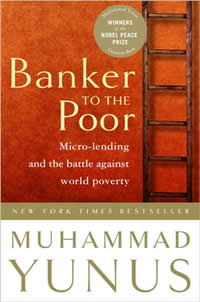Book Notes
 Muhammad Yunus, Banker to the Poor; Micro-Lending and the Battle Against World Poverty (New York: Public Affairs, 1999, 2003), 273pp.
Muhammad Yunus, Banker to the Poor; Micro-Lending and the Battle Against World Poverty (New York: Public Affairs, 1999, 2003), 273pp.
Muhammad Yunus was born in 1940, the third of fourteen children, to an extremely devout Muslim family in Chittagong, the largest port city in Bangladesh. After studies at Dhaka University, and then University of Colorado and Vanderbilt (where he earned his PhD in economics), Yunus returned to help nation-build in Bangladesh, which had declared its independence from Pakistan in 1971. The independence movement had taken its toll; three million people were dead and 10 million were refugees. In 1974, a famine struck.
As he tried to alleviate the broad and deep poverty in his homeland, Yunus came to "dread" his economics lectures. They were tragically far removed from the everyday lives of normal people. In a theme that would characterize much of the rest of his life, Yunus almost completely abandoned classical book learning in favor of listening to and learning directly from the extreme poor — the millions of Bangladeshis living off two cents a day. In 1976 he loaned $27 to 42 villagers, and thus was born what eventually became the Grameen Bank (grameen means rural). As of the publication of this revised autobiography in 2003, Grameen and its many replicants had made $3.8 billion of micro-loans to 2.4 million families in over 100 countries. The borrowers themselves own 93% of the bank equity, 95% of the loan recipients are women, and the repayment rate on the loans is 98%. For all that, in 2006 Yunus and Grameen won the Nobel Peace Prize (not to mention more than two dozen honorary doctorates).
Yunus is an excellent writer and story-teller. He shares at length about the many criticisms, myths, and prejudices he's had to face, especially from the "obtuse ineptitude" of governments and the sclerotic bureaucracy of aid organizations (he's particularly critical of the World Bank). He has tremendous faith in the initiative, skill, resilience and creativity of the poor. They're the ultimate entrepreneurs. "Not one single Grameen borrower requires any special training" (205), or any collateral, for that matter. Conversely, Yunus also believes that the poor have many things to teach the rich. When the World Bank's president Barber Conable bragged to Yunus about hiring the best minds in the world, he responded that "hiring smart economists does not necessarily translate into policies and programs that help the poor." Spurning conventional wisdom about development aid and economic categories of the liberal left and the free market right, Grameen's success speaks for itself. As a follow up, see Yunus's newest book called Creating a World Without Poverty: Social Business and the Future of Capitalism (New York: Public Affairs, 2007).


